Q&A Interview w/ MANHATTAN's Rachel Brosnahan, John Benjamin Hickey, Olivia Williams, More + EPs
Maj Canton - July 25, 2014
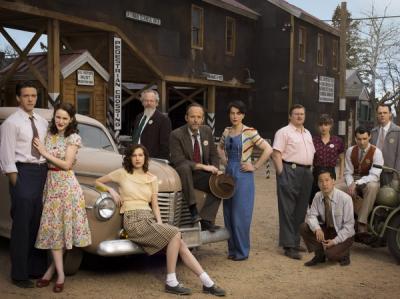
Earlier this month, TV Tango attended the Television Critics Association 2014 Summer Press Tour, where MANHATTAN stars John Benjamin Hickey, Olivia Williams, Rachel Brosnahan, Daniel Stern, & Ashley Zukerman and executive producers Sam Shaw & Thomas Schlamme dished details about the new series, including what life was like on the set (two words: neti pots), the major themes in the first season, and how MANHATTAN could continue as a series -- even after the bombs are dropped.
MANHATTAN premieres on Sunday, July 27, 2014 at 9pm ET/PT on WGN America, with encore telecasts on Tribune stations in 33 markets nationwide on premiere night, including WPIX/New York, KTLA/Los Angeles, WGN/Chicago, WPHL/Philadelphia and WDCW/Washington, DC. One week later, MANHATTAN will continue its 13-episode first season on WGN America at its regular time: Sundays at 10pm ET/PT.
Set in the 1940s in Los Alamos, New Mexico, MANHATTAN is a one-hour drama that follows the brilliant but clandestine scientists and their families, as they attempt to build the world's first atomic bomb while co-existing in a world where secrets and lies infiltrate every aspect of their lives. Frank Winter (John Benjamin Hickey), a bold and off-center American genius, is commissioned to help lead the Manhattan Project, which includes his team of scientists recruited to work on a project even they could know nothing about until their arrival. Frank, a self-destructive professor who prefers ideas to people, moves to Los Alamos with his wife Liza (Olivia Williams), a brilliant botanist, and their 16-year-old daughter Callie. If it weren't for his wife, Frank would have become a recluse years ago, and he becomes a man alone when military secrecy severs his lifeline of communication with Liza, leaving her feeling alone and conflicted. She is snubbed by the housewives, who think of her as a scientist, and shunned by the scientists, who think of her as a wife. Once Frank and his team are inside "The Hill," a middle-class bubble on a dusty foothill in the New Mexico desert, they begin to sense that this is no ordinary assignment. In fact, they are living in a town with the world's highest concentration of geniuses, yet it can't be found on any map -- a place where men and women are torn between duty and their moral values, husbands and wives conceal the truth from each other and their families, the military keeps secrets from the scientists they chaperone, and the scientists keep secrets from each other. Other fictional Project team and family members include: Charlie Isaacs (Ashley Zukerman), a brilliant wunderkind previously spurned by Frank, who uproots his wife and young son to move from the East Coast; Abby Isaacs (Rachel Brosnahan), a privileged girl from the Boston suburbs, who agrees to follow her husband Charlie to the middle of nowhere and remains a good, if indulgent, mother to their son; and Glen Babbit (Daniel Stern), a former mentor to Frank, who keeps him out of trouble by helping him navigate the political minefield of Los Alamos.
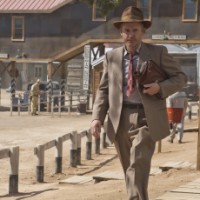 John Benjamin Hickey as Frank Winter |
Question: Thomas, you created PAN AM, which had this glowing beauty to it and now MANHATTAN, which has kind of a bleak desolate look. What was it like to create those visuals? Thomas Schlamme: That [referring to a preview clip that was shown immediately before the Q&A] looked bleak? (Laughter.) Well, first of all,there was no intention of, "Gee, I was able to work in the '60s with PAN AM and now the '40s." I just happened upon a really great script, which was the most exciting day in a long time for me. Where we are shooting this is how we sort of set this world up. We are shooting it in New Mexico at a location that we found early on when we were sort of coming up with how do we put this show together. And what Sam had written was a show not only about science -- on the men and women who work there -- but about a family and a community. So that's a big world to set up. We found an old Army hospital that was ready to be torn down. I mean days away. If we had gone location scouting two weeks later, it might not have been there. The actors don't know this was filled with asbestos, so don't let them know that, whatever you do. But we were able to clean everything out. We abated everything. We basically took ten acres, and we created a world. And part of that hope was to create a world that they could walk into that didn't feel like a sound stage, that really felt like maybe what it could have felt for the men and women who were transported from their homes and just plopped into the desert. |
|
|
|
|
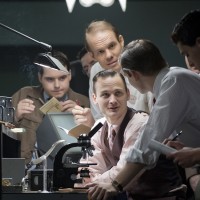 |
Question: Could reflect on the straight-to-series order that MANHATTAN received and how that might have changed your storytelling perspective? Sam Shaw: So what I can say about that, from my standpoint, is it was incredibly liberating. Obviously there's work that any first episode of any TV series needs to do to introduce the world and introduce the characters, and we still felt that responsibility. But there's a thing that happens in the pilot process where you feel enormous pressure to jam the great Episode 6 cliffhanger into the end of Act 2. And I think there's often a sense that you are forcing an emotional experience onto a viewer as the viewers are just getting their bearings and learning who the characters are. What was really great for us in this experience is that we not only felt the freedom to slow down the storytelling, we also had a dictum from our partners at the network. |
|
Sam Shaw (continued): They had this script, they read it, they sat down with us, and they said, "This is great. We have some thoughts. There are a couple of story turns here that we think you can sit on. Let's take some time, and let's really spend some time getting to know the characters." It's incredibly exciting as a writer. It's a note that you almost never get in your lifetime, and so, from my standpoint, it was really helpful to the show. |
|
|
|
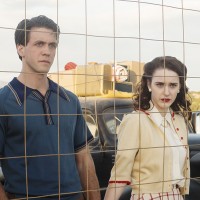 Ashley Zukerman as Charlie Isaacs and Rachel Brosnahan as Abby Isaacs |
Question: Sam, The Manhattan Project obviously covered a finite amount of time. How fast do you move through time in the season? And what do you envision for future seasons? Sam Shaw: That's a great question. From the outset, for me, the concession of this show was that it would not be a finite story that ends with the end of a war. It's actually not a story about the end of World War II; it's a story about a birth of an era. One thing, I'm a real book nerd and research nerd, and it was really exciting to me as I began to immerse myself in the world of the history of Los Alamos in the 1940s. It was a situation that was already really fraught of all of these physicists and their families and the military in this very peculiar bubble in the middle of nowhere, which actually only became more complicated and more interesting after the bombs were dropped. |
|
Olivia Williams: What's very positive for us as actors, looking for long term work, is that Los Alamos is still the foremost nuclear research center on earth. So, hopefully, it will be a job well into my eighties. (Laughter.) Sorry, that was flippant. |
|
|
|
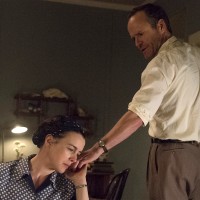 Olivia Williams as Liza Winter and John Benjamin Hickey as Frank Winter |
Question: Are these people real people? I mean, are they based on real people? Thomas Schlamme: These are real people [pointing to the actors on stage]. (Laughter.)
Question: I know Oppenheimer was real, but I didn't recognize any of the names. |
|
Sam Shaw (cont): But the approach of this show and my thinking from the beginning is that although it is set in a world that is really carefully researched -- and we make painstaking efforts to be as faithful to history and science as we possibly can be, as someone who is neither an historian nor a physicist, but we keep them around to keep us honest. The model for us is E.L. Doctorow's Ragtime. It's a story that captures the emotional truth and as much of the texture of a time and place, although it's populated with fictional characters. Question: Are we going to see Oppenheimer at all after the first episode? Sam Shaw: What I can say is that he is a character who returns, but there's a, sort of, Olympian godlike quality to him in the role that he plays in our storytelling. He's not at the forefront of every story we tell. |
|
|
|
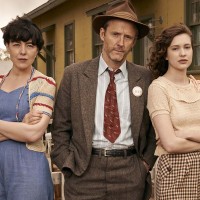 Olivia Williams as Liza Winter, John Benjamin Hickey as Frank Winter and Alexia Fast as Callie Winter |
Question: Is the government cooperating in any way at all, or is this all based on various source materials, and you are kind of piecing together composite characters and what might have happened? Thomas Schlamme: Well, the government is not restricting us in any way. So, from my point of view, then they are cooperating. (Laughter.) We haven't really asked for anything yet. We didn't need, like many shows, the Department of Defense when you need certain equipment or things like that. But, obviously, much of the research that we've done has come from files from the government that we were able to have access to and read and use to our benefit. |
|
|
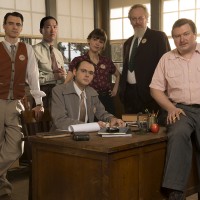 Harry Lloyd as Paul Crosley, Eddie Shin as Sid Liao, Christopher Denham as Jim Meeks, Katja Herbers as Helen Prins, Daniel Stern as Glen Babbit and Michael Chernus as Louis ‘Fritz’ Fedowitz |
Question: As you were putting this show together, did the film FAT MAN AND LITTLE BOY inform you about the issue of rampant anti Semitism in America and how Jewish scientists involved in the project were torn? MANHATTAN is much more of a family oriented theme, but will it explore some of those themes? Ashley Zukerman: It definitely has never felt, in the making of this show, that it's a family-oriented show. I think it's about families only to the extent that it's about human beings, and there's something inherent in the events that took place in Los Alamos that had a huge impact on families. I think all those themes are very pressing. I think anything that happened there that was material, we used. Anti Semitism in particular is very present in our show. A lot of the characters are Jewish, and they are in some way being used by a country that didn't really trust them and have a place for them. But, despite that, these men chose to continue their work and what they were doing. To answer your question, it is something we deal with, and it is very present in our show. |
|
|
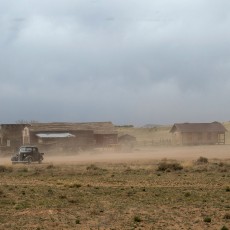 Set of MANHATTAN. |
Question: Did the location for your filming affect your performance? John Benjamin Hickey: This is very similitude that only God could make. We shoot outside -- 60% of each episode is exterior -- and we shoot on a ranch that's probably 20,000 acres or something. So as far as the eye can see, it looks like 1942 or earlier. And the amount of weather that dominates your performance. It's about surviving the wind, as much as it is playing an objective. It's so liberating for an actor to not be confined by lights and a room. It's amazing. If one more person says to me, "You don't like the weather in New Mexico? Wait five minutes." I've never seen weather more wacky in my life. Have you ever used a neti pot? Do you know what a neti pot is? I didn't know what a neti pot was until this job. |
|
Rachel Brosnahan: Me neither. |
|
|
|
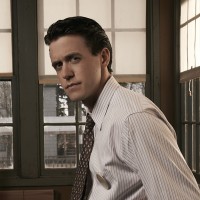 Ashley Zukerman as Charlie Isaacs |
Question: Could you talk about the process of both depicting, but also crediting, intellectual and scientific discovery for fictional characters in an historical setting? Sam Shaw: A show that I worked on prior to working on this show was MASTERS OF SEX, which has some shared DNA with this show, in that you are dealing with, in that case, a somewhat fictionalized representation of the lives of real people. To a certain extent on that show we had to come up with our own rules of engagement. It wouldn't have felt appropriate for William Masters to perform the first open heart surgery because he didn't, and at the same time, we had to put words in his mouth while he was eating a Danish in the morning at work. In terms of this show, it's not as if we subscribed to a set of hard and fast rules. A lot of the storytelling in our show revolves around a particular group at Los Alamos. That group existed. The science existed. The people who were involved in that group were quite different, and so I can't say that there was a pure math to how we would approach those questions. It just was sort of a case-by-case basis and trying to create a show that had scientific verisimilitude and also not rob the graved history. |
|
Ashley Zukerman: And also the fact that there were thousands of scientists working on this project, and what we are trying to do is explore an emotional event that happened at the time. That would be impossible if we were making a documentary about one or two people. There are times when scientists make discoveries that were made by other people, but I think we have that freedom because these characters are made up. I don't think -- and I would hope that no one would ever feel insulted -- that we are taking their property. |
|
|
|
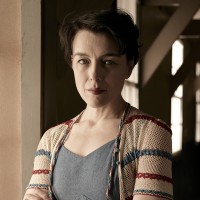 Olivia Williams as Liza Winter |
Question: Married women in the '40s often had fairly restricted lives and moving to Los Alamos and being under the auspices of the military made those even more restrictive. Is there anything liberating for you as actors playing people with those restrictions? Rachel Brosnahan: It's a very strange place for this time in history, because it was very definitive for a lot of these women. There are a lot of accounts from the women who came there as wives who weren't scientists and who weren't there to work on the project. In a lot of ways, they were restricted by these sort of vague and impossible rules, but they were also very liberated in a lot of ways. So we've said a bunch of times on this show, the rules don't apply during wartime. Women who were never ever expected to work have jobs, and they're expected to take on other responsibilities. So in a way, I love it as an actor because we're playing people and we're all under the same restrictions in a way. There aren't any different restrictions for women necessarily in Los Alamos. And so for Abby, and I'm sure for all of us, we're growing in extraordinary ways given these new responsibilities, and there's a lot of self reflection that's happening. So in a way, they're becoming liberated under these strange and extraordinary circumstances. |
|
Olivia Williams: I had the enormous privilege a couple of years ago to play Eleanor Roosevelt, and it seemed from my research then that, in fact, women were more liberated in the '40s than they were in the '50s... |
|
|
|
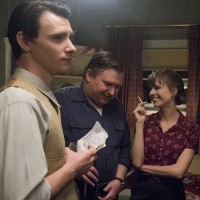 Harry Lloyd as Paul Crosley, Michael Chernus as Louis “Fritz” Fedowitz, and Katja Herbers as Helen Prins. |
Question: Why do you think historical shows are so popular now? Daniel Stern: Why historical? I think it's an interesting way to do a commentary on our society now, rather than directly talking about secrets or our NSA spying or our decisions about how we go to war or what wars we fight or how we fight them or drone activity. It's an interesting way to bring up those topics, but with a little distance, with a little fiction between it, and gives us a chance to have that discussion. There's a lot of issues that we maybe can't talk about or aren't as dramatic in the present that I think can lead to interesting storytelling and mirror what our situation now. |
|
Thomas Schlamme: Technology has helped that a great deal. The fact you can use CGI, that television has grown up so much in the last 20 years. First of all, there's so many more shows, but you don't have to restrict yourself anymore and go, "Well, how am I going to set up a world in the '40s or a GAME OF THRONES or PAN AM when we did it. Twenty years ago, if you tried to pitch a show that was set in 1940s, it was a much more difficult world to maneuver than it is now. And I think what Danny says most of all, is there are all these stories we haven't told yet that are so applicable to our lives today. |
|
|
|
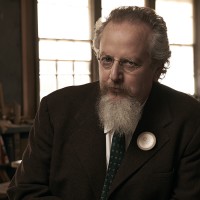 Daniel Stern as Glen Babbit |
Question: Daniel, you're not just using a fake beard obviously. You're living the look of the character and so forth? Daniel Stern: That's right. (Laughter.) Talk to my wife about that. (Laughter.) Question: Do people react to you differently when you have this look? Daniel Stern: when I look like this? |
|
Rachel Brosnahan: I'm terrified. (Laughter.) |
|
|
|
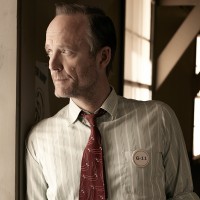 John Benjamin Hickey as Frank Winter |
Question: John, your character is in a great deal of agony, but he also has this tremendous faith in America. Do you envy his total idealism? Is it hard to play someone who's constantly ravaged like that? John Benjamin Hickey: Yeah, it is. I love him. I love this guy so much, and I just think about my sorry my father, my uncle who were both in Word War II, and this is a generation mine and Danny's characters are guys who were part of the war that was supposed to have ended all wars and then find themselves in their 50s and 60s back at it. And we live in such a cynical and bitter time now politically, to think how bitter and cynical and essentially just physically exhausted these guys must have been. And still the idea that the Germans and Hitler might get us, and just imagine what that must be like to get up every morning and know how united your country is in one common pursuit. And it's horrible because it's war. This brings up the moral quandary of it all. It's horrible because it's war, but it's such a great cause to protect the American way of life. So I love I love the idea of going back there and visiting that. |
|
|
 Rachel Brosnahan as Abby Isaacs |
Question: Rachel, what part of the character did you like playing? And did your past roles from HOUSE OF CARDS and THE BLACKLIST help you get into the character? Rachel Brosnahan: There are so many wonderful things about playing this character. It's extraordinarily different from anything I've ever done. It's a huge departure from anything like HOUSE OF CARDS or THE BLACKLIST, which has been incredibly exciting and terrifying. One of the nicest things about playing this character is that in television it's hard sometimes, because we don't know what's going to happen next. we get a new script, and all of a sudden, everything changes, and it affects things that you've already done, and you're like, "Oh, God, that doesn't make any sense." But for Abby coming here every second is like that. Every second is a new discovery, and it's terrifying and exhilarating all at the same time. So it's been very cool to play that and do that both as Abby and as myself. |
|
|
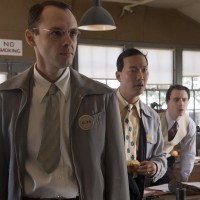 Christopher Denham as Jim Meeks, Eddie Shin as Sid Liao and Harry Lloyd as Paul Crosley |
Question: Is this an era you're more comfortable in right now or are they coming to you saying, "We just need something sort of epic from the past"? Thomas Schlamme: Honestly, I think Danny did answer it. I think it's so great to be able to separate yourself from the contemporary constraints and tell stories of a past that you didn't know about but actually what those stories are still the human condition. That is exactly what great drama is all about. So you're doing two things. You're getting to tell wonderful stories, and you're getting to transport people. I am also sort of a research nerd, and I loved the idea when I read this to go back into that world to figure out as much as I could about that world so that I could then throw it away and just tell stories. When somebody was asking earlier about discovery and for these scientists what's that like. What was interesting is what did that feel like when they went home that night? What did that feel like the next day when they woke up? What's the emotional stuff of all of those things? |
|
Thomas Schlamme (cont): I have two 20-year-old kids who certainly knew about the Manhattan Project. They sort of studied it a little bit in school, but they're fascinated by this show and watching the first couple of episodes because, number one, they kind of recognize the people and who they are and they think, "God, what if I was taken to a place where I could reinvent myself?" And also what about, "Should we have built that bomb, dad? Do you think that was a good idea that we built that bomb?" You know, they were asking all sorts of other questions that, if this was set in contemporary times, they probably wouldn't be asking. So, you know, it's a privilege. I think the technology allows the privilege. |
|
|
|
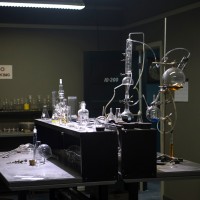 Set of MANHATTAN. |
Question: Do we ever see any effects of the radiation? Sam Shaw: It's a little spoilery. So, but ... |
|
Olivia Williams: In one of the anecdotes I found at the museum in Los Alamos, there was a housewife very similar to Abby, and her husband who never came home early appeared at the back door, wearing nothing by underwear, and he said, "I've been exposed to radiation, and I may not see you again." |
|
|
|
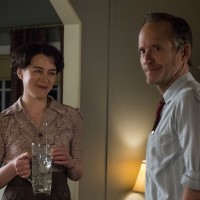 Olivia Williams as Liza Winter and John Benjamin Hickey as Frank Winter |
Question: What are your feelings about the idea of never being able to put the genie back into the bottle? Ashley Zukerman: I think that's a central question that all of the characters ask of themselves, and one of the things I love about the show is that it doesn't try to answer that question but just proposes characters who tackle that question themselves. This is a world where there is a team in Germany working on the same thing. So there is a now issue, which is to protect our country, our way of life. But the characters do wonder what happens after that and what humanity is if we do make this thing. |
|
Daniel Stern: I love the nuclear issue coming up again, because I feel as a citizen I've been lulled into this sense that the nuclear warheads -- the thousands and thousands of these nuclear bombs -- are still there. They're still updated every day. They're still trigger systems and codes ready to launch these things, and that conversation never happens anymore in this country. We had it for a while during the Cold War, but now it's still out there, and that genie is not back in the bottle. It's expanding and growing into new and more dangerous ways. So I hope it stimulates the conversations of some sort. |
|
|
|
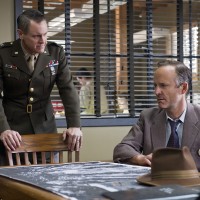 Mark Moses as Col. Alden Cox and John Benjamin Hickey as Frank Winter |
Question: Are you going to touch on the financial cost? Because during the war, it was in danger of bankrupting the country. Also, do you address what Truman said after the bomb dropped that it's the greatest thing ever? Thomas Schlamme: First of all, this was a $2 billion black ops, what was going on at this point. The U.S. Congress did not know about it. The Vice President did not know about it. And yet it cost $2 billion in 1944. So you can imagine what that was and what an enormous scientific achievement that that was. Was that worth it? Germany didn't have a bomb, we found out later as that was sort of going on. But the genie is out of the bottle. So it doesn't really matter at that moment. And that became part of the great drama that we're trying to set up, which was not the sort of big moral questions but the drama of "What if we don't get any more money?" "What if they think that this isn't going to work?" This guy has to figure out another plan because the other bomb might not work. So it's what drives the drama, but the conflict that was there was a military installation and there was a scientific installation, and those two people had to get along. Imagine today if you took the greatest professors in all our universities and stuck them in a place that the military was in charge of. A pretty tough place? |
|
|
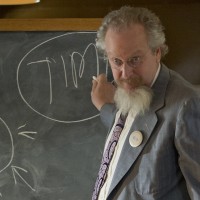 Daniel Stern as Glen Babbit |
Question: Is there a parallel between Germany saying they had a bomb and Iraq saying they had weapons of mass destruction? Olivia Williams: Full marks. You've spotted it. Good. Well done. (Laughter.) Top of the class. |
|
|
If you can't wait for MANHATTAN to premiere on Sunday, July 27, 2014 at 9pm ET/PT on WGN America, then check out this new extended trailer (released on July 25):
